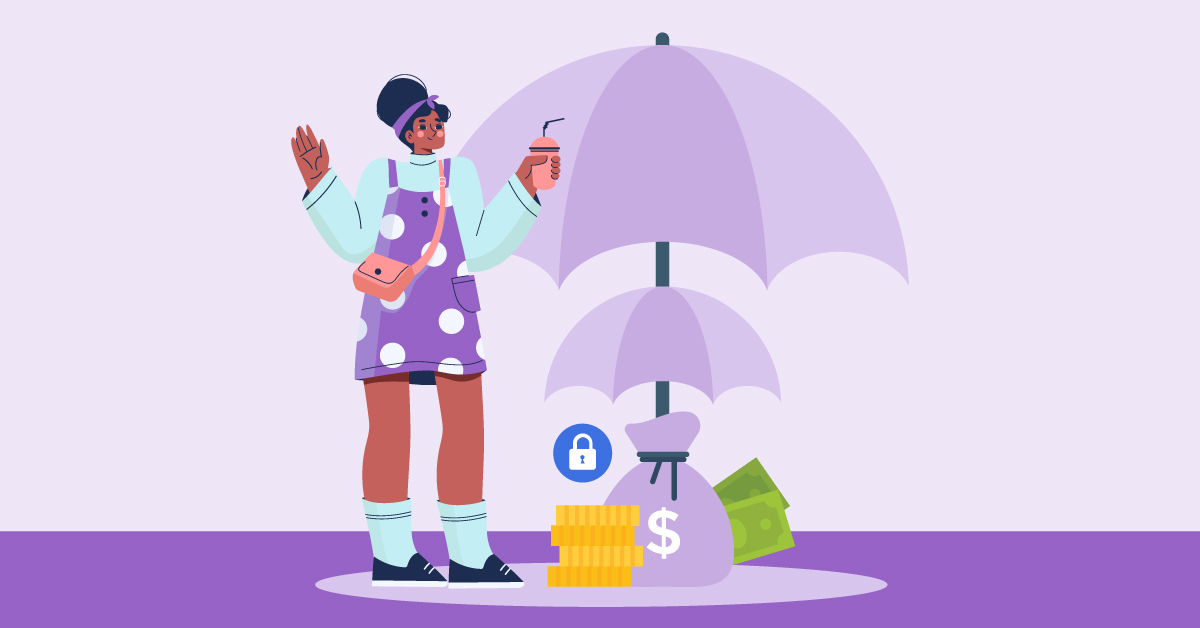The insurance world is vast and notoriously expensive. You likely already have some kind of insurance policy, whether it be in the form of an auto, renters, or homeowners policy. But today, we’re going to talk about a different kind of policy that often gets overlooked—umbrella insurance.
While it might not make the headlines, umbrella insurance is a great resource to have in your pocket in case disaster strikes.
What is Umbrella Insurance?
Did you know that America holds the top spot for most lawsuits each year? Umbrella insurance is personal liability insurance that extends the coverage you already carry in your home, auto, or boat coverage, often in the event of a lawsuit. [As a reminder, personal liability insurance is the pocket that pays for other people’s damage if you are deemed at fault for an incident.]
While many auto policies carry $50,000 in coverage for personal liability, and home policies can carry up to $300,000, an umbrella policy starts at $1 million.
Seem a bit excessive?
Think again. If you cause an accident, someone is injured, and a lawsuit follows, it won’t be all that difficult to extend beyond the reach of your auto or home coverage limits.
What Does This Look Like In Real Life?
Let’s say your new teen driver was driving and didn’t see a patch of ice. They slid out of their lane and initiated a multi-car pileup. It just so happened that one of the passengers in another car was badly injured. They survived but got paralyzed. Every impacted driver and passenger will be looking to you for car repairs, medical bills, and in the case of the paralyzed passenger, money to make up for their inability to work. Most full-coverage auto policies carry a $300,000 limit per occurrence. Once that is spent, you will become personally responsible for making up the rest.
Or, let’s say you have a Christmas party, and your neighbor’s sweet grandma comes but slips on your steps. If they sue you, you will be responsible for her medical bills, pain and suffering, physical therapy, and all the attorney bills wracked up along the way.
If you have umbrella insurance, your policy will pick up the tab where your home and auto policies leave off, helping you stay financially stable and avoid bankruptcy.
What Does Umbrella Insurance Cover?

As a type of liability policy, umbrella insurance covers damages to other people and their property. These expenses often come in the form of vehicle repair and medical bills. As an added benefit, your umbrella coverage doesn’t stop with you; it covers everyone in the household. So, your umbrella insurance will also cover your accident-prone child or a risk-loving teenager.
As mentioned before, your umbrella insurance will also cover attorney fees, loss of work, and emotional pain and suffering that the victim endures as a result of the incident.
Other things often covered by umbrella policies are damages sustained while in your watercraft, wrongful entry, invasion of privacy, libel, slander, and false imprisonment.
What Isn’t Covered
Any damage done to your own property is not covered by your umbrella coverage—that would be picked up by your auto, home, or boat policy. Similarly, any medical bills you or your household sustains will be subject to the limits of your other policies. If you find yourself out of work because of your injuries, a disability policy will come into play.
Other things not covered by an umbrella policy include damage done during business activities, intentional damage/injury, and liability related to armed conflicts.
How Much Does Umbrella Insurance Cost?
Thankfully, umbrella insurance is relatively inexpensive in regard to the amount of coverage you carry. For $1 million in coverage, you can expect to pay about $150-300 each year, which is probably lower than you are paying each year for your other policies. The reason the cost is so low is because you already have those other policies. Therefore, the chances of filing a claim on your umbrella policy are significantly lower than filing on an auto, home or even boat policy.
Are There Any Downsides To Having Umbrella Insurance?
One of the biggest downsides to umbrella insurance is the fact that you will likely have to increase your coverage on your existing home, auto, and boat policy before you can add on an umbrella policy. In other words, you may have to max out your options with your current policies before you qualify for an umbrella policy. While this makes sense, it could also result in a significantly higher premium.
Also, as is the case with all insurance policies, you run the risk of purchasing coverage you don’t end up using.
FAQS
Here are the most common questions about umbrella insurance.
Who needs umbrella insurance?
Anyone who is at risk for a hefty lawsuit should plan on getting an umbrella policy. Unfortunately, with the prominence of lawsuits rising, no one is immune from the risk. If you have a number of assets or are a public figure, your chances of facing a lawsuit run higher, and an umbrella policy is particularly important.
Other things that increase your risk of a lawsuit include certain home features, such as a swimming pool, hot tub, and trampoline, or if you often have guests at your house.
What does umbrella insurance not cover?
Just like all insurance policies, your umbrella insurance has exclusions. While it’s designed to pay for damages you inflict on other people and their property, it will not cover any damage or medical bills for you. It also won’t cover any intentional harm or any accidents during business activities.
How much coverage should my umbrella policy carry?
Umbrella policies generally start at $1 million in coverage, with the option to add on additional millions. If you have a number of assets, such as a luxury house, cars, boat and retirement fund, you should plan on additional coverage.
Is Umbrella Insurance Worth It?
While umbrella insurance was once used almost exclusively by the upper class, more and more families are choosing to protect themselves and their assets with an umbrella policy. As Allstate says, mayhem can happen anywhere. With the current lawsuit-happy society we live in, umbrella insurance provides peace of mind in the midst of a tragedy. And the cost of umbrella insurance is significantly lower than other policies, so it makes sense to add the coverage if you have a number of assets to protect.
You might also be interested in: Your Guide to Understanding Private Health Insurance





